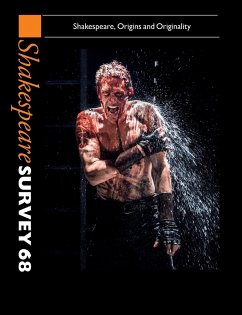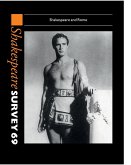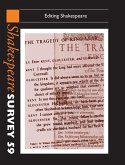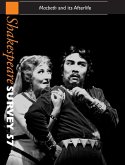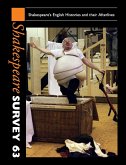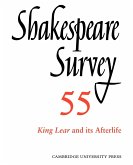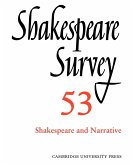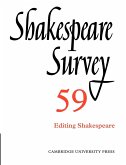Shakespeare Survey 68
Herausgeber: Holland, Peter
Shakespeare Survey 68
Herausgeber: Holland, Peter
- Broschiertes Buch
- Merkliste
- Auf die Merkliste
- Bewerten Bewerten
- Teilen
- Produkt teilen
- Produkterinnerung
- Produkterinnerung
The theme for Shakespeare Survey 68 is 'Shakespeare, Origins and Originality'.
Andere Kunden interessierten sich auch für
![Shakespeare Survey Shakespeare Survey]() Shakespeare Survey38,99 €
Shakespeare Survey38,99 €![Shakespeare Survey Shakespeare Survey]() Peter Holland (ed.)Shakespeare Survey123,99 €
Peter Holland (ed.)Shakespeare Survey123,99 €![Shakespeare Survey v57 Shakespeare Survey v57]() Peter Holland (ed.)Shakespeare Survey v57115,99 €
Peter Holland (ed.)Shakespeare Survey v57115,99 €![Shakespeare Survey Shakespeare Survey]() Shakespeare Survey50,99 €
Shakespeare Survey50,99 €![Shakespeare Survey Shakespeare Survey]() Shakespeare Survey52,99 €
Shakespeare Survey52,99 €![Shakespeare Survey Shakespeare Survey]() Peter Holland (ed.)Shakespeare Survey61,99 €
Peter Holland (ed.)Shakespeare Survey61,99 €![Shakespeare Survey Shakespeare Survey]() Shakespeare Survey39,99 €
Shakespeare Survey39,99 €-
-
-
The theme for Shakespeare Survey 68 is 'Shakespeare, Origins and Originality'.
Hinweis: Dieser Artikel kann nur an eine deutsche Lieferadresse ausgeliefert werden.
Hinweis: Dieser Artikel kann nur an eine deutsche Lieferadresse ausgeliefert werden.
Produktdetails
- Produktdetails
- Verlag: Cambridge University Press
- Seitenzahl: 488
- Erscheinungstermin: 1. April 2021
- Englisch
- Abmessung: 246mm x 189mm x 26mm
- Gewicht: 935g
- ISBN-13: 9781107519770
- ISBN-10: 1107519772
- Artikelnr.: 60797117
- Herstellerkennzeichnung
- Libri GmbH
- Europaallee 1
- 36244 Bad Hersfeld
- gpsr@libri.de
- Verlag: Cambridge University Press
- Seitenzahl: 488
- Erscheinungstermin: 1. April 2021
- Englisch
- Abmessung: 246mm x 189mm x 26mm
- Gewicht: 935g
- ISBN-13: 9781107519770
- ISBN-10: 1107519772
- Artikelnr.: 60797117
- Herstellerkennzeichnung
- Libri GmbH
- Europaallee 1
- 36244 Bad Hersfeld
- gpsr@libri.de
1. Shakespeare's anecdotal character Margreta de Grazia; 2. What is a
source? Or, how Shakespeare read His Marlowe Laurie Maguire and Emma Smith;
3. Imitation or collaboration? Marlowe and the early Shakespeare canon Gary
Taylor and John V. Nance; 4. 'O Jephthah, judge of Israel': from original
to accreted meanings in Hamlet's allusion Péter Dávidházi; 5. The
elephants' graveyard revisited: Shakespeare at work in Antony and
Cleopatra, Romeo and Juliet and All's Well That Ends Well Catherine Belsey;
6. 'Every like is not the same': translating Shakespeare in Spanish today
Alfredo Michel Modenessi; 7. Reading originals by the light of translations
Tom Cheesman; 8. 'My name is Will': Shakespeare's sonnets and autobiography
Stanley Wells; 9. Tracings and data in The Tempest: author, world and
representation Janet Clare; 10. Shakespearean gesture: narrative and
iconography Farah Karim-Cooper; 11. The origin of the late Renaissance
dramatic convention of self-addressed speech James Hirsh; 12. Reading in
their present: early readers and the origins of Shakespearian appropriation
Jean-Christophe Mayer; 13. Shakespeare out of time (or, Hugo takes
dictation from the beyond) Ruth Morse; 14. Betrayal, derail, or a thin
veil: the myth of origin Bi-qi Beatrice Lei; 15. Global Shakespeares,
affective histories, cultural memories Jyotsna G. Singh and Abdulhamit
Arvas; 16. Spinach and tobacco: making Shakespearian unoriginals Peter
Holland; 17. Ren Fest Shakespeare: the cosplay Bard Andrew James Hartley;
18. 'Dead as earth': contemporary topicality and myths of origin in King
Lear and The Shadow King Kate Flaherty; 19. Shakespeare and the idea of
national theatres Michael Dobson; 20. John Rice and the boys of the
Jacobean King's Men David Kathman; 21. Shakespeare's Irish lives: the
politics of biography Andrew Murphy; 22. Shakespeare in blockaded Berlin:
the 1948 'Elizabethan Festival' Bettina Boecker; 23. Connecting the Globe:
actors, audience and entrainment Robert Shaughnessy; 24. 'Freetown!':
Shakespeare and social flourishing Ewan Fernie; 25. We'll always have
Paris: the third household and the 'bed of death' in Romeo and Juliet
Nicholas Crawford; 26. The 'serpent of old Nile': Cleopatra and the
pragmatics of reported speech Jelena Marelj; 27. 'This insubstantial
pageant faded': the drama of semiotic anxiety in The Tempest Lynn
Forest-Hill; 28. Shakespeare performances in England 2014 Carol Chillington
Rutter; 29. Professional Shakespeare productions in the British Isles,
January-December 2013 James Shaw; The year's contribution to Shakespeare
studies: 1. Critical studies Charlotte Scott; 2. Shakespeare in performance
Russell Jackson; 3. Editions and textual studies Peter Kirwan.
source? Or, how Shakespeare read His Marlowe Laurie Maguire and Emma Smith;
3. Imitation or collaboration? Marlowe and the early Shakespeare canon Gary
Taylor and John V. Nance; 4. 'O Jephthah, judge of Israel': from original
to accreted meanings in Hamlet's allusion Péter Dávidházi; 5. The
elephants' graveyard revisited: Shakespeare at work in Antony and
Cleopatra, Romeo and Juliet and All's Well That Ends Well Catherine Belsey;
6. 'Every like is not the same': translating Shakespeare in Spanish today
Alfredo Michel Modenessi; 7. Reading originals by the light of translations
Tom Cheesman; 8. 'My name is Will': Shakespeare's sonnets and autobiography
Stanley Wells; 9. Tracings and data in The Tempest: author, world and
representation Janet Clare; 10. Shakespearean gesture: narrative and
iconography Farah Karim-Cooper; 11. The origin of the late Renaissance
dramatic convention of self-addressed speech James Hirsh; 12. Reading in
their present: early readers and the origins of Shakespearian appropriation
Jean-Christophe Mayer; 13. Shakespeare out of time (or, Hugo takes
dictation from the beyond) Ruth Morse; 14. Betrayal, derail, or a thin
veil: the myth of origin Bi-qi Beatrice Lei; 15. Global Shakespeares,
affective histories, cultural memories Jyotsna G. Singh and Abdulhamit
Arvas; 16. Spinach and tobacco: making Shakespearian unoriginals Peter
Holland; 17. Ren Fest Shakespeare: the cosplay Bard Andrew James Hartley;
18. 'Dead as earth': contemporary topicality and myths of origin in King
Lear and The Shadow King Kate Flaherty; 19. Shakespeare and the idea of
national theatres Michael Dobson; 20. John Rice and the boys of the
Jacobean King's Men David Kathman; 21. Shakespeare's Irish lives: the
politics of biography Andrew Murphy; 22. Shakespeare in blockaded Berlin:
the 1948 'Elizabethan Festival' Bettina Boecker; 23. Connecting the Globe:
actors, audience and entrainment Robert Shaughnessy; 24. 'Freetown!':
Shakespeare and social flourishing Ewan Fernie; 25. We'll always have
Paris: the third household and the 'bed of death' in Romeo and Juliet
Nicholas Crawford; 26. The 'serpent of old Nile': Cleopatra and the
pragmatics of reported speech Jelena Marelj; 27. 'This insubstantial
pageant faded': the drama of semiotic anxiety in The Tempest Lynn
Forest-Hill; 28. Shakespeare performances in England 2014 Carol Chillington
Rutter; 29. Professional Shakespeare productions in the British Isles,
January-December 2013 James Shaw; The year's contribution to Shakespeare
studies: 1. Critical studies Charlotte Scott; 2. Shakespeare in performance
Russell Jackson; 3. Editions and textual studies Peter Kirwan.
1. Shakespeare's anecdotal character Margreta de Grazia; 2. What is a
source? Or, how Shakespeare read His Marlowe Laurie Maguire and Emma Smith;
3. Imitation or collaboration? Marlowe and the early Shakespeare canon Gary
Taylor and John V. Nance; 4. 'O Jephthah, judge of Israel': from original
to accreted meanings in Hamlet's allusion Péter Dávidházi; 5. The
elephants' graveyard revisited: Shakespeare at work in Antony and
Cleopatra, Romeo and Juliet and All's Well That Ends Well Catherine Belsey;
6. 'Every like is not the same': translating Shakespeare in Spanish today
Alfredo Michel Modenessi; 7. Reading originals by the light of translations
Tom Cheesman; 8. 'My name is Will': Shakespeare's sonnets and autobiography
Stanley Wells; 9. Tracings and data in The Tempest: author, world and
representation Janet Clare; 10. Shakespearean gesture: narrative and
iconography Farah Karim-Cooper; 11. The origin of the late Renaissance
dramatic convention of self-addressed speech James Hirsh; 12. Reading in
their present: early readers and the origins of Shakespearian appropriation
Jean-Christophe Mayer; 13. Shakespeare out of time (or, Hugo takes
dictation from the beyond) Ruth Morse; 14. Betrayal, derail, or a thin
veil: the myth of origin Bi-qi Beatrice Lei; 15. Global Shakespeares,
affective histories, cultural memories Jyotsna G. Singh and Abdulhamit
Arvas; 16. Spinach and tobacco: making Shakespearian unoriginals Peter
Holland; 17. Ren Fest Shakespeare: the cosplay Bard Andrew James Hartley;
18. 'Dead as earth': contemporary topicality and myths of origin in King
Lear and The Shadow King Kate Flaherty; 19. Shakespeare and the idea of
national theatres Michael Dobson; 20. John Rice and the boys of the
Jacobean King's Men David Kathman; 21. Shakespeare's Irish lives: the
politics of biography Andrew Murphy; 22. Shakespeare in blockaded Berlin:
the 1948 'Elizabethan Festival' Bettina Boecker; 23. Connecting the Globe:
actors, audience and entrainment Robert Shaughnessy; 24. 'Freetown!':
Shakespeare and social flourishing Ewan Fernie; 25. We'll always have
Paris: the third household and the 'bed of death' in Romeo and Juliet
Nicholas Crawford; 26. The 'serpent of old Nile': Cleopatra and the
pragmatics of reported speech Jelena Marelj; 27. 'This insubstantial
pageant faded': the drama of semiotic anxiety in The Tempest Lynn
Forest-Hill; 28. Shakespeare performances in England 2014 Carol Chillington
Rutter; 29. Professional Shakespeare productions in the British Isles,
January-December 2013 James Shaw; The year's contribution to Shakespeare
studies: 1. Critical studies Charlotte Scott; 2. Shakespeare in performance
Russell Jackson; 3. Editions and textual studies Peter Kirwan.
source? Or, how Shakespeare read His Marlowe Laurie Maguire and Emma Smith;
3. Imitation or collaboration? Marlowe and the early Shakespeare canon Gary
Taylor and John V. Nance; 4. 'O Jephthah, judge of Israel': from original
to accreted meanings in Hamlet's allusion Péter Dávidházi; 5. The
elephants' graveyard revisited: Shakespeare at work in Antony and
Cleopatra, Romeo and Juliet and All's Well That Ends Well Catherine Belsey;
6. 'Every like is not the same': translating Shakespeare in Spanish today
Alfredo Michel Modenessi; 7. Reading originals by the light of translations
Tom Cheesman; 8. 'My name is Will': Shakespeare's sonnets and autobiography
Stanley Wells; 9. Tracings and data in The Tempest: author, world and
representation Janet Clare; 10. Shakespearean gesture: narrative and
iconography Farah Karim-Cooper; 11. The origin of the late Renaissance
dramatic convention of self-addressed speech James Hirsh; 12. Reading in
their present: early readers and the origins of Shakespearian appropriation
Jean-Christophe Mayer; 13. Shakespeare out of time (or, Hugo takes
dictation from the beyond) Ruth Morse; 14. Betrayal, derail, or a thin
veil: the myth of origin Bi-qi Beatrice Lei; 15. Global Shakespeares,
affective histories, cultural memories Jyotsna G. Singh and Abdulhamit
Arvas; 16. Spinach and tobacco: making Shakespearian unoriginals Peter
Holland; 17. Ren Fest Shakespeare: the cosplay Bard Andrew James Hartley;
18. 'Dead as earth': contemporary topicality and myths of origin in King
Lear and The Shadow King Kate Flaherty; 19. Shakespeare and the idea of
national theatres Michael Dobson; 20. John Rice and the boys of the
Jacobean King's Men David Kathman; 21. Shakespeare's Irish lives: the
politics of biography Andrew Murphy; 22. Shakespeare in blockaded Berlin:
the 1948 'Elizabethan Festival' Bettina Boecker; 23. Connecting the Globe:
actors, audience and entrainment Robert Shaughnessy; 24. 'Freetown!':
Shakespeare and social flourishing Ewan Fernie; 25. We'll always have
Paris: the third household and the 'bed of death' in Romeo and Juliet
Nicholas Crawford; 26. The 'serpent of old Nile': Cleopatra and the
pragmatics of reported speech Jelena Marelj; 27. 'This insubstantial
pageant faded': the drama of semiotic anxiety in The Tempest Lynn
Forest-Hill; 28. Shakespeare performances in England 2014 Carol Chillington
Rutter; 29. Professional Shakespeare productions in the British Isles,
January-December 2013 James Shaw; The year's contribution to Shakespeare
studies: 1. Critical studies Charlotte Scott; 2. Shakespeare in performance
Russell Jackson; 3. Editions and textual studies Peter Kirwan.

